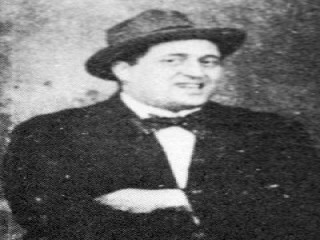
Guillaume Apollinaire biography
Date of birth : 1880-08-26
Date of death : 1918-11-09
Birthplace : Rome, Italy
Nationality : French
Category : Famous Figures
Last modified : 2011-05-28
Credited as : Poet and playwright, Zone, Alcools
Guillaume Apollinaire was a great French lyric poet. A leading figure in the avant-garde before World War I, he produced criticism and theortical writings that have significantly influenced esthetic movements from cubism to those of the present day.
Guillaume Apollinaire was the pseudonym of Wilhelm Apollinaris de Kostrowitsky, the illegitimate son of an Italian army officer and a young Polish noblewoman. He was born in Rome on Aug. 26, 1880, and brought up in various towns in southern France where his mother happened to be sojourning. In 1899 Apollinaire went to Paris to live and, without money or diplomas, had difficulty. However, between odd jobs as a literary hack, tutor, bank clerk, and journalist, he managed to travel on the Continent and make two trips to London. Also he had a few love affairs that later figured in his poetry.
The most important aspect of Apollinaire's first years in Paris was his encounter with writers and artists. Jovial and full of enthusiasm, he became the welcome companion of the young modernists in the Bohemia of the day. He helped found little reviews and wrote articles defending what later was dubbed cubism. He wrote fiction, too, and poems that appeared in magazines, ultimately published in 1913 in a volume entitled Alcools (Alcohols). The originality of these poems lies more in the subtle handling of image and rhythm to express emotion than in technical innovation. Yet in correcting the proofs, Apollinaire rubbed out all punctuation and placed at the head of the collection a quite recent poem called "Zone," which is a sort of manifesto of modernism and, in form, less orthodox than the others.
When war broke out in 1914, Apollinaire enlisted and found in combat new themes of poetic inspiration. Wounded in 1916, he was sent back to Paris, where the generation of future Dadaists and surrealists greeted him as a chief. In the following year the presentation of The Breasts of Tiresias, a burlesque play very much in the modern mood, and a lecture on the "new spirit" gave him considerable notoriety.
His second volume of verse, Calligrammes, appeared in 1918. Here Apollinaire demonstrates in metrical innovations the modernism which he preached for poetry in "Zone." There are poems made of snatches of conversation, of enumeration, and of simple notation which infuse daily banalities with lyrical magic. There are the "ideograms," which give the volume its title—"visual" poems which imitate, in typography and in placement on the page, the subject matter.
The year 1918 was one of fulfillment for Apollinaire as an artist and a person. Hitherto unfortunate in love, particularly with the painter Marie Laurencin, he found happiness with Jacqueline Kolb, the "beautiful redhead" of the last poem in Calligrammes. They married in May. Six months later, at the age of 38, Apollinaire died of influenza in Paris.
A bilingual edition of Alcools was published in 1965 by the University of California Press. Francis Steegmuller provided the fullest biography, Apollinaire, Poet among the Painters (1963). Scott Bates, Guillaume Apollinaire (1967), enhanced by a bibliography and appendixes, is primarily devoted to an analysis of the poetry but is hampered by exclusive use of English translation.
















